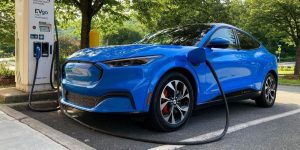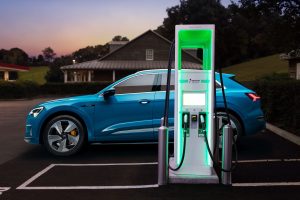
The advent of electric vehicles (EVs) has brought about a seismic shift in the automotive industry, reshaping not only how we think about transportation but also how we experience road trips. This article delves into the multifaceted ways in which electric vehicles are changing road trips, focusing on technological advancements, environmental impact, infrastructure development, and the evolving consumer mindset.
Technological Advancements
One of the most significant advancements in electric vehicles is the improvement in battery technology. Modern EVs are equipped with lithium-ion batteries that offer longer ranges and faster charging times compared to their predecessors. This development has made long-distance travel more feasible, alleviating the range anxiety that once plagued early adopters.

Autonomous Driving
Many electric vehicles come with advanced driver-assistance systems (ADAS) that enhance the driving experience. Features like adaptive cruise control, lane-keeping assistance, and even full self-driving capabilities are becoming increasingly common. These technologies not only make road trips safer but also more enjoyable by reducing driver fatigue.
Connectivity
Electric vehicles are often at the forefront of automotive connectivity. Many EVs come with integrated infotainment systems that offer real-time navigation, traffic updates, and charging station locations. This connectivity ensures that drivers are always informed and can plan their trips more efficiently.
Environmental Impact
One of the most compelling reasons for the shift to electric vehicles is their environmental benefits. EVs produce zero tailpipe emissions, significantly reducing the carbon footprint of road trips. This is particularly important in the context of global efforts to combat climate change.
Sustainable Energy
Many electric vehicle owners are also adopting renewable energy sources to charge their cars. Solar panels and wind turbines are becoming common additions to homes, allowing for a more sustainable and eco-friendly way to power road trips. This shift towards renewable energy further amplifies the positive environmental impact of electric vehicles.
Infrastructure Development
The proliferation of electric vehicles has spurred a rapid expansion of charging infrastructure. Public and private entities are investing heavily in building a network of fast-charging stations across highways and popular travel routes. This development ensures that EV drivers have easy access to charging facilities, making long-distance travel more convenient.
Smart Grids
The integration of electric vehicles into the grid has also led to advancements in smart grid technology. Smart grids can manage the demand for electricity more efficiently, ensuring that charging stations are adequately powered without straining the overall energy supply. This technological synergy is crucial for the sustainable growth of electric vehicle adoption.
Evolving Consumer Mindset
While the initial cost of electric vehicles can be higher than traditional internal combustion engine (ICE) vehicles, the long-term savings are substantial. Lower fuel costs, reduced maintenance expenses, and government incentives make EVs an economically viable option for many consumers. This cost efficiency is encouraging more people to consider EVs for their road trips.

Travel Experience
Electric vehicles offer a different travel experience compared to traditional cars. The quiet operation, instant torque, and smooth acceleration make for a more enjoyable drive. Additionally, the need to plan charging stops adds an element of adventure and discovery to road trips, encouraging travelers to explore new destinations.
Community and Culture
The rise of electric vehicles has also given birth to a new community of EV enthusiasts. Online forums, social media groups, and local clubs provide platforms for EV owners to share experiences, tips, and travel itineraries. This sense of community enhances the overall road trip experience, fostering a culture of sustainability and innovation.
Challenges and Future Prospects
Despite significant advancements, range anxiety remains a concern for many potential EV buyers. The fear of running out of battery in remote areas can deter people from choosing electric vehicles for long road trips. However, continuous improvements in battery technology and the expansion of charging infrastructure are gradually mitigating this issue.
Charging Time
Another challenge is the time it takes to charge an electric vehicle. While fast-charging stations can replenish a battery in under an hour, this is still longer than the time it takes to refuel a traditional car. Innovations in battery technology and charging solutions are needed to make charging times comparable to refueling times.
Market Adoption
The adoption rate of electric vehicles varies significantly across different regions. While some areas have embraced EVs wholeheartedly, others are lagging due to a lack of infrastructure, government support, or consumer awareness. Addressing these disparities is crucial for the widespread adoption of electric vehicles.
Conclusion
Electric vehicles are undeniably changing the landscape of road trips. Technological advancements, environmental benefits, infrastructure development, and an evolving consumer mindset are all contributing to this transformation. While challenges remain, the future of road trips with electric vehicles looks promising, offering a more sustainable, enjoyable, and innovative way to explore the world.










